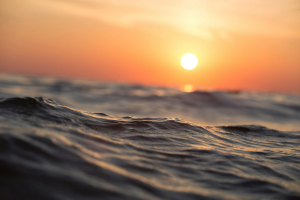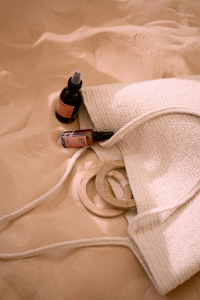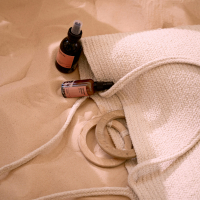
The appeal of cosmetics is undeniable, offering benefits like glowing skin, sun protection, shiny hair and many others. While cosmetics enhance our beauty and care routines, their regulatory focus on human safety rather than environmental impact, meaning that some ingredients may harm the environment, including marine ecosystems. The industry is now seeking sustainable improvements in sourcing, manufacturing and product lifecycle, while educating consumers on better choices. This article explores how cosmetic components, from microplastics to packaging, affect marine health, highlighting substances non-compliant with the NATRUE Label, the International Standard for Natural and Organic Cosmetics.
Microplastics: Tiny pollutants with a huge impact
Microplastics are tiny plastic particles (smaller than 5mm) intentionally added to products. Microbeads are a type of microplastic used for scrubbing or exfoliating in cosmetics, often used as cheap fillers[1]. The issue is that microplastics can pass through water filtration systems, entering rivers, lakes, and oceans. Being non-biodegradable, they accumulate in marine ecosystems.
Microbeads are banned in Europe, and a transitional ban on microplastics is in place as per Commission Regulation (EU) 2023/2055, but they are still sold in some markets, found in facial exfoliants, shower gels, toothpastes and lip products.
Based on their origin and manufacture, microbeads do not comply with NATRUE Criteria, which allows instead many natural alternatives such as coffee grounds, salt, and ground vegetable shells and seeds.
UV-Filters: Protecting skin, affecting marine ecosystems
UV filters in sunscreens protect the skin from UV radiation, but certain ones like oxybenzone and octinoxate can affect marine life by contributing to coral bleaching.
Coral reefs degradation significantly impacts marine ecosystems and human communities reliant on them. For this reason, places like Thailand and Hawaii have banned some chemical UV filters, and Maui has banned all chemical ones, permitting only mineral sunscreens (despite both having an impact on marine life).
NATRUE criteria do not allow chemical UV-filters, i.e., by choosing NATRUE certified sunscreens, consumers find only nature-identical mineral UV filters like Titanium Dioxide and Zinc Oxide.
Silicones and Petroleum Ingredients: Concerns for Aquatic Environments
S ilicones and petroleum-derived ingredients like petrolates, paraffin and ozokerite pose persistent environmental risks in cosmetics. While silicones offer a smooth texture and protective barrier, their poor biodegradability raises toxicity concerns for aquatic life. Similarly, petrolates, paraffin, and ozokerite, prized for their moisturizing properties, also linger in the environment and can form a barrier on the surface of the water, reducing oxygen exchange and impacting the survival of marine organisms.
ilicones and petroleum-derived ingredients like petrolates, paraffin and ozokerite pose persistent environmental risks in cosmetics. While silicones offer a smooth texture and protective barrier, their poor biodegradability raises toxicity concerns for aquatic life. Similarly, petrolates, paraffin, and ozokerite, prized for their moisturizing properties, also linger in the environment and can form a barrier on the surface of the water, reducing oxygen exchange and impacting the survival of marine organisms.
Due to their origin and manufacture, these ingredients do not meet NATRUE criteria for natural and organic cosmetics. By choosing NATRUE-labelled products it is possible to avoid them and find many valuable and sustainable alternatives such as vegetable butters and oils, natural origin short-chain esters, starch derivatives, mineral or vegetable powders, etc.
Packaging: A Persistent Problem
While the focus is often on the ingredients within cosmetics, the packaging also plays a significant role in environmental pollution. Non-recycled and non-recyclable packaging contributes to the growing problem of plastic waste in oceans: at current pollution rates, the ocean will contain 1 ton of plastic for every 3 tons of fish by 2025, and more plastics than fish (by weight) by 2050[2].
Most of the plastic pollution in the oceans is caused by improperly disposed plastic packaging, which can end up in waterways and eventually in the ocean, where it can be ingested by fish causing blockages in the digestive tract, or become microplastics.
NATRUE acknowledges the importance of make cosmetic packaging more sustainable and has introduced criteria to minimize it and promoted reuse and recycling, also banning halogenated plastics.
NATRUE’s commitment for more sustainable cosmetics
NATRUE, an international organization dedicated to natural and organic cosmetics, plays a pivotal role in promoting sustainability within the beauty industry. By setting stringent standards, NATRUE encourages manufacturers to adopt eco-friendly practices, meeting consumer demand for ethical products.
The beauty industry’s impact on marine environments is concerning, with various cosmetic components contributing to ocean pollution. NATRUE’s proactive approach emphasizes the need for a collective effort from manufacturers, consumers and regulatory bodies to shift towards sustainable cosmetics. Choosing NATRUE-certified products empowers consumers to protect oceans, fostering a future where beauty and environmental sustainability thrive together.
[1] https://www.beatthemicrobead.org/
[2] https://www.ecoenclose.com/what-can-i-do-about-marine-plastic-pollution/

Article written by Paula Gómez de Tejada, NATRUE Global Communications and Public Relations Manager, and Diana Malcangi, NATRUE Scientific and Regulatory Consultant. It was originally published in Italian on Mabella (available here)



 Deutsch
Deutsch
 Español
Español
 Français
Français
 Italiano
Italiano